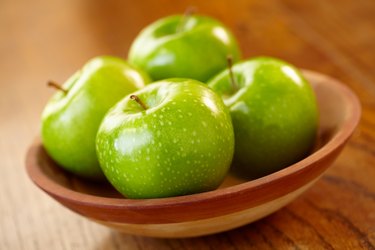
Here's a frustrating fact: Although irritable bowel syndrome (IBS) affects up to 45 million people in the U.S., we still don't know what causes it. What's more, there's no cure for the condition, and it shows up differently in each person.
For these reasons, there's no one "best" treatment for everyone. Living with the condition means working with your doctor to come up with the best strategies to manage your individual symptoms and avoid triggers that cause symptom flare-ups.
"Education plays a significant role in this condition," Ashkan Farhadi, MD, a gastroenterologist at MemorialCare Orange Coast Medical Center, tells LIVESTRONG.com. "If you know how to manage it, you will not have a flare to begin with."
Here are some research-backed home remedies for IBS to discuss with your treatment team.
1. Identify and Avoid 'Trigger' Foods
When it comes to IBS, there is no one-size-fits-all-solution for diet. Foods that may trigger symptoms like diarrhea, constipation or abdominal pain in one person may be just fine for another.
"I recommend an individualistic approach to eating," says Cara Marrs, RDN, a registered dietitian with UCHealth – Yampa Valley Medical Center. "Everyone will respond differently to different foods depending on symptoms and possible food sensitivities."
It's also the combination of certain foods with your environment that can lead to IBS symptoms, Dr. Farhadi says. He points out, for instance, that you may be fine drinking coffee on the beach during a relaxing vacation, but at home, chugging coffee before your final exam may lead to a flare-up.
For this reason, Dr. Farhadi suggests classifying foods that are always off-limits for you and foods that may be tolerable in certain situations. A good place to start is with FODMAP foods.

FODMAPs and IBS
A low-FODMAP diet can help those with IBS better identify their problem foods, Kathy LeBarre, RDN, an outpatient dietitian with Spectrum Health, tells LIVESTRONG.com.
FODMAPs — that is, fermentable oligosaccharide, di-saccharide, mono-saccharide and polyols — are specific sugars and fibers found in some foods, LeBarre says, including some fruits, vegetables, dairy and grains. They contain carbohydrates that are rapidly fermented by gut bacteria and can contribute to diarrhea, gas and bloating.
By following the diet, you can identify any FODMAP foods you're eating on a daily basis and start an elimination process to determine which trigger your IBS symptoms.
Ready to Give It a Try?
2. Make Other Tweaks to Your Diet
Although your food triggers will be personal, there are some more general diet recommendations you can try as you navigate your IBS symptoms:
Eat a low-fiber diet to calm symptoms: Marrs recommends a temporary low-fiber diet if your primary symptoms are diarrhea, gas, reflux and bloating, as easing off the fiber for a short time can help calm the GI tract.
Eat a high-fiber diet to prevent reoccurrence: However, once symptoms improve, Marrs says the nutrient should be re-introduced to the diet.
"As inflammation decreases, the person should be eating a diet higher in fiber from whole food sources that in the long run will often help with IBS recurrence," she says.
Drink more water: When you do eat high-fiber foods, Marrs adds that it's important to stay hydrated, especially if you're experiencing constipation.
"When consuming foods high in soluble fiber, we need water to help the fiber bind the contents of our intestines, to carry them out as waste," she says.
Cut out processed foods and sugar: If your IBS symptoms are all over the map and you don't know what changes to make to your diet, Marrs says cutting out all sugary and processed foods (think: soda, desserts, snack foods) is a good place to start.
Keep a food diary: Dr. Farhadi says that, in general, anyone with IBS should keep a food journal to see if they can find an association between their symptoms and certain foods.
3. Try Probiotics
According to Dr. Farhadi, anyone with IBS should consider taking probiotics, which are beneficial bacteria that you can ingest for digestion purposes.
"Probiotics are one of the elements that can reduce symptoms and calm down the situation in the gut," he says.
Keep in mind, though, that there are different types of probiotics, and what works for one person may not work for another.
LeBarre suggests choosing a probiotic geared toward the specific symptoms you are experiencing — and if you're aren't seeing a positive result after four weeks, stop taking it.
Tip
Before you opt in, check the supplement's label: Some probiotics may aggravate IBS symptoms because they contain ingredients similar to FODMAP foods, LeBarre says.
In addition to probiotic supplements, Marrs says you may want to incorporate prebiotic foods into your diet to help probiotics colonize in the gut. Prebiotics include foods high in fiber such as garlic, leeks, sunchokes and greens.
According to an April 2019 review in the American Journal of Clinical Nutrition, prebiotics have not been shown to directly improve the symptoms of IBS, but they do increase the colonization of certain beneficial bacteria in the gut.
Is Yogurt Good for IBS?
While yogurts with high counts of live cultures could boost beneficial gut bacteria and help with constipation, watch out for those high in sugar, as these could make IBS symptoms worse, Marrs says.
4. Consider Certain Herbal Remedies
Certain herbs may help ease IBS symptoms, LeBarre says, including foods or teas made from ginger, fennel, peppermint or licorice root.
Although conclusive research around these herbs is lacking, there is evidence that peppermint oil may help. A February 2012 study in The World Journal of Gastroenterology found that among various natural supplements, taking a capsule of peppermint oil helped improve IBS symptoms — namely, decreasing the severity of abdominal pain, abdominal distension, stool frequency and flatulence.
LeBarre cautions, though, that if you're following a FODMAP-restricted diet, you may want to avoid anything with chamomile or fennel, as they are high in FODMAPs.

5. Reduce Stress
Beyond diet, stress is a major culprit behind IBS symptom flares, Dr. Farhai says. So learning how to effectively manage stress is crucial to living with the condition.
"We can't get rid of stress," he says. "The trick is learning how to manage it and let it pass through you without affecting you."
Dr. Farhadi prescribes two main ways to manage stress for people with IBS, which are echoed by many other experts: regular exercise and meditation.
Related Reading
One of the primary things he suggests to his patients is what he calls a "meditative walk," which is a mixture of the two techniques. This involves walking at a fast pace for 20 to 30 minutes every single day, following the same route, without any music or any companions (dogs included) to try to minimize distractions.
The key is empty to your mind and try not to not think about anything, so it becomes a form of meditation, Dr. Farhadi says.
In addition to regular exercise and meditation — moving or not — you can incorporate other stress-management techniques into your life, such as:
- Spend extra time in nature
- Yoga
- Write in a journal
- Quit smoking
- Eat regularly and do not skip meals
- Minimize stress at meal times
Related Reading
Is this an emergency? If you are experiencing serious medical symptoms, please see the National Library of Medicine’s list of signs you need emergency medical attention or call 911.